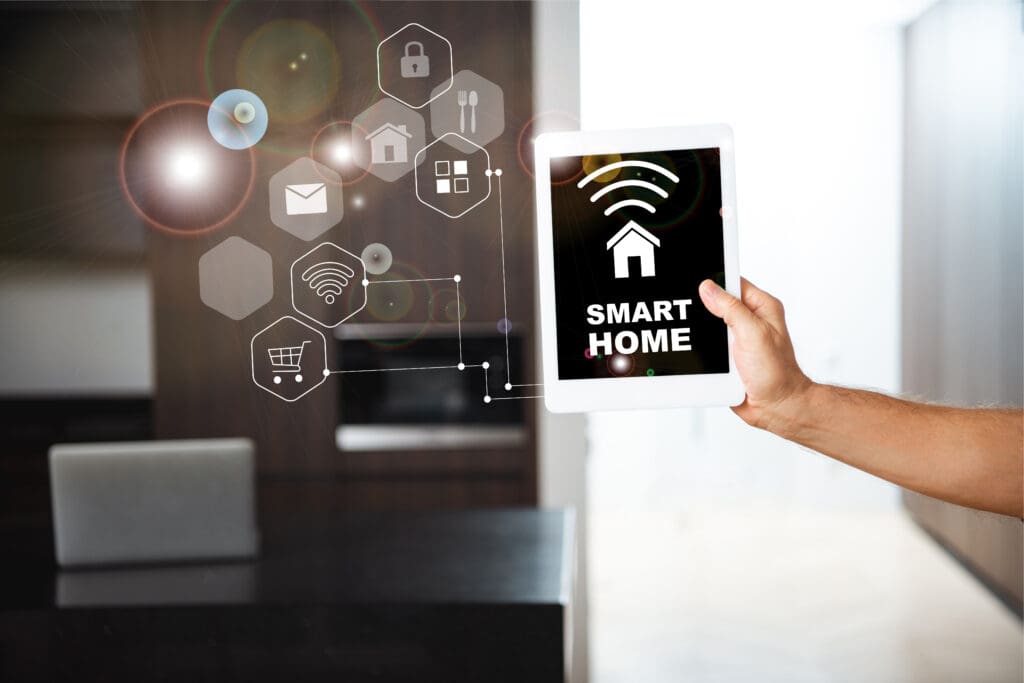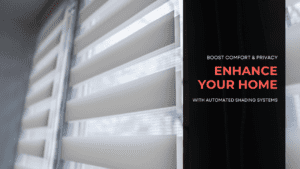Key Highlights
- Smart home technology is rapidly growing, with a projected global market value exceeding $191 billion by 2028.
- Studies show that a significant percentage of homebuyers are more inclined to purchase properties equipped with smart home features.
- Smart home technology encompasses a range of devices that offer network connectivity, automation, and remote control capabilities.
- Features like smart security systems, energy-efficient appliances, and smart lighting are among those that can potentially increase a home’s value.
Overview
In an era defined by technological advancements, home automation is transforming the real estate landscape. As smart home technology becomes increasingly prevalent, homeowners and potential buyers alike are curious about its impact on property value.
Does investing in a smart home equate to a higher return on investment? This comprehensive blog post explores the intricate relationship between home automation and its influence on property values, providing valuable insights for homeowners looking to make informed decisions about smart home upgrades.
Exploring the Impact of Home Automation on Property Values

The integration of smart home technology has sparked considerable debate within the real estate industry regarding its effect on property value. While some argue that the presence of sophisticated gadgets alone is insufficient to justify a significant price increase, others contend that the convenience, efficiency, and enhanced security offered by these systems contribute to a home’s value.
Undoubtedly, the allure of a technologically advanced dwelling resonates with a growing segment of home buyers. The ability to control lighting, temperature, and security systems remotely, coupled with the potential for energy savings, can sway purchasing decisions in a competitive market.
The Rise of Smart Homes in the United States
The United States has witnessed a surge in the popularity of smart homes in recent years. As technology continues to evolve at an unprecedented pace, home buyers, particularly millennials, are increasingly seeking properties equipped with the latest smart home features. This growing demand is driven by a desire for convenience, connectivity, and enhanced security.
The widespread adoption of smartphones, tablets, and high-speed internet has paved the way for seamless integration of smart devices into everyday life. Homeowners are increasingly embracing the ability to control various aspects of their living spaces with a few taps on their devices.
How Home Automation Affects Appraisals and Buyer Interest
Home automation is beginning to influence the way appraisers assess the value of a home. Traditionally, appraisers have focused on factors such as square footage, location, and the age of appliances. However, as smart home technology becomes more prevalent, these features are being factored into valuations.
The presence of smart home systems, particularly those integrated with essential functions like heating, cooling, and security, can lead to higher appraisals. This is because these systems enhance the functionality, efficiency, and overall desirability of the property in the eyes of potential buyers.
Furthermore, home automation can significantly impact buyer interest. Studies have shown that homes equipped with smart tech, such as smart thermostats and doorbells, tend to sell faster and at higher prices compared to their traditional counterparts.
Key Home Automation Features That Boost Home Value

For homeowners evaluating ROI, our comprehensive automation setup guide breaks down each phase—from initial planning to device integration—so you know exactly where value is added.
When considering smart home features that can enhance home value, it’s crucial to prioritize those that offer practical benefits and appeal to a broad range of potential buyers. Energy efficiency is a significant selling point, making features like smart thermostats, lighting systems, and appliances particularly attractive.
Additionally, smart home security, including smart locks, cameras, and alarm systems, provides peace of mind and can be a significant value proposition. By focusing on features that enhance both comfort and security, homeowners can maximize the return on their smart home investments.
Smart Security Systems and Their Influence on Home Safety Perceptions
In today’s world, home safety is paramount, and smart security systems have emerged as a game-changer in providing homeowners with enhanced protection and peace of mind. The integration of smart locks, cameras, and motion sensors allows for comprehensive monitoring and control, even when homeowners are away.
Smart security systems not only deter potential intruders but also provide valuable evidence in case of an incident. The ability to remotely monitor the property, receive instant alerts, and grant access to trusted individuals significantly enhances security measures.
This enhanced level of safety and control is a significant draw for potential buyers, making properties equipped with smart security systems more appealing in the market.
Energy-Efficient Smart Devices and Sustainability
The growing emphasis on sustainability has led to an increased demand for energy-efficient homes. Smart devices, particularly those designed to optimize energy consumption, have become synonymous with eco-conscious living.
Here are some ways smart devices increase sustainability:
- Smart thermostats: These devices learn homeowners’ preferences and adjust heating and cooling accordingly, reducing energy waste and lowering utility bills.
- Smart lighting: By automatically adjusting brightness levels based on ambient light and occupancy, smart lighting systems minimize energy consumption.
- Smart appliances: Appliances equipped with smart features optimize their operation to reduce water and electricity usage.
These smart devices not only contribute to a more sustainable lifestyle but also appeal to environmentally conscious buyers, potentially increasing the value of a home.
Boston Automations’ comprehensive automation services—which seamlessly integrate lighting, climate control, security, and entertainment—can significantly enhance your home’s resale appeal.
Elevate Your Space!
Home automation can significantly enhance your property’s value by offering convenience, security, and energy efficiency. The growing trend of smart homes in the US indicates a shift towards modern living preferences.
Features like smart security systems and energy-efficient devices not only elevate safety perceptions but also reduce utility costs, making your home more appealing to buyers. If you’re considering integrating smart technology into your home, remember that it can positively impact appraisals and buyer interest.
For more insights on how home automation can boost your property’s value, don’t hesitate to get in touch with our experts for personalized guidance.
Frequently Asked Questions
Do All Smart Home Improvements Equally Increase Home Value?
Not all smart home improvements are created equal when it comes to boosting home value. While features like smart security systems, smart thermostats, and smart lighting are generally considered desirable, less common or niche smart tech may not provide a significant return on investment. Focus on upgrades that offer broad appeal and enhance functionality.
Can Installing Smart Home Technology Speed Up the Home Selling Process?
Yes, integrating smart home technology can often expedite the selling process. Homes equipped with home automation features tend to stand out in the market and pique the interest of a wider range of potential buyers. This increased interest can lead to quicker offers and a faster sale, often at a higher price point.
How Do Smart Homes Perform in the Market Compared to Non-Smart Homes?
Smart homes are increasingly outperforming traditional homes in the real estate market. Studies reveal that properties equipped with smart home devices tend to sell faster and command higher prices than their non-smart counterparts. This trend highlights the growing demand for smart home technology among homebuyers.
Is There a Return on Investment for High-End Smart Home Systems?
While high-end smart home systems can offer luxurious features and seamless control, the return on investment may vary depending on the target market and the overall value of your home. It’s essential to consider whether potential buyers in your area are willing to pay a premium for such advanced technology. Focus on features like smart appliances and a smart system that adds value without over-improving the property.




